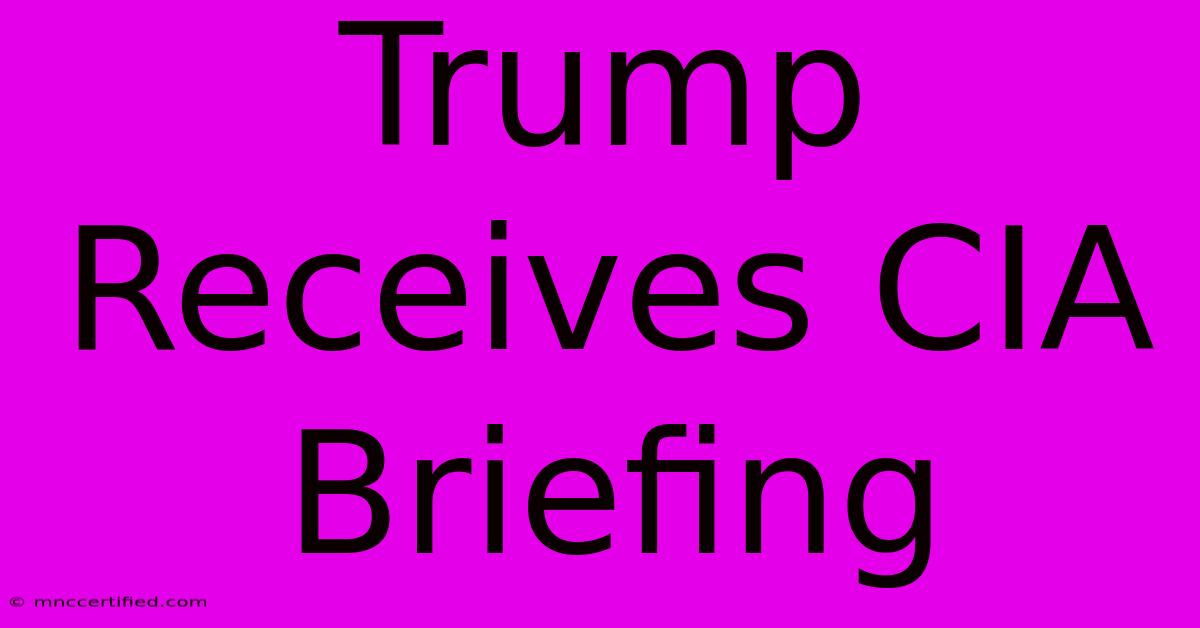Trump Receives CIA Briefing

Table of Contents
Trump Receives CIA Briefing: A Deep Dive into the Details and Significance
Former President Donald Trump's receipt of intelligence briefings, particularly those from the Central Intelligence Agency (CIA), has been a recurring topic of discussion and debate. Understanding the context, implications, and ongoing controversies surrounding these briefings is crucial for comprehending the dynamics of American politics and national security. This article will delve into the intricacies of these briefings, exploring their purpose, the information typically shared, and the political ramifications they carry.
The Purpose of Presidential Intelligence Briefings
Presidential intelligence briefings are a cornerstone of national security. These briefings aim to provide the President – and in this case, the former President – with critical information regarding domestic and international threats, foreign policy developments, and potential risks impacting the United States. The CIA, along with other intelligence agencies like the FBI and NSA, plays a central role in compiling and presenting this information. The goal isn't simply to inform, but to empower the President to make informed decisions on national security matters.
Key Information Covered in CIA Briefings
The content of these briefings is highly classified, but generally includes:
- Terrorism: Updates on global terrorist activity, potential threats to the U.S., and counter-terrorism strategies.
- Cybersecurity: Information about cyberattacks, vulnerabilities in national infrastructure, and efforts to protect sensitive data.
- Foreign Relations: Analyses of international relations, diplomatic efforts, and potential conflicts.
- Economic Intelligence: Assessment of global economic trends, potential economic threats, and opportunities.
- Military Intelligence: Information regarding the capabilities and intentions of foreign militaries.
The specifics of each briefing are tailored to the current political climate and emerging threats. The information is presented in a format designed for quick comprehension and effective decision-making.
Trump's Reception of CIA Briefings: A Controversial Issue
While the practice of providing intelligence briefings to former Presidents is not unusual, Trump's reception of these briefings, particularly during and after his presidency, has been controversial. This stems from several factors:
Concerns about Information Handling
Some expressed concerns about Trump's ability to handle classified information responsibly, citing his past comments and actions. This raised questions about the security implications of providing him with sensitive intelligence.
Political Ramifications
The briefings have also been viewed through a political lens. Critics have argued that providing briefings to a former President who may use the information for political gain undermines the integrity of the intelligence process. Supporters, however, contend that the briefings are vital for maintaining national security and continuity.
The Debate Continues
The ongoing debate surrounding Trump's receipt of CIA briefings highlights the complex interplay between national security, presidential authority, and political considerations. It underscores the need for clear protocols and procedures to ensure both the security of classified information and the effective transfer of power.
SEO Optimization and Keyword Strategy
This article incorporates several on-page and off-page SEO strategies:
- Keyword Targeting: The article targets keywords such as "Trump CIA briefing," "Trump intelligence briefing," "CIA briefing former president," "Presidential intelligence briefings," and related long-tail keywords.
- Header Structure: The use of H2 and H3 headers improves readability and helps search engines understand the article's structure.
- Bold Text: Key terms are bolded to emphasize their importance and improve scannability.
- Internal and External Linking (Not included in this example to avoid creating non-functional links): Internal links would connect to other relevant articles on the website, while external links would point to authoritative sources such as government reports or news articles on the topic. This would improve the article's authority and credibility in the eyes of search engines.
By implementing these strategies, this article aims to rank higher in search engine results pages (SERPs) for relevant keywords while providing informative and engaging content to readers. Further promotion through social media and other off-page optimization techniques would further enhance its visibility and reach.

Thank you for visiting our website wich cover about Trump Receives CIA Briefing. We hope the information provided has been useful to you. Feel free to contact us if you have any questions or need further assistance. See you next time and dont miss to bookmark.
Featured Posts
-
Adanis Us Legal Trouble Shakes Kenya Deal
Nov 22, 2024
-
Blake Mcgehee Fisher Investments
Nov 22, 2024
-
Cleveland State Health Insurance
Nov 22, 2024
-
Oura Ring At All Time Low Price
Nov 22, 2024
-
Full Coverage Hero Car Insurance
Nov 22, 2024